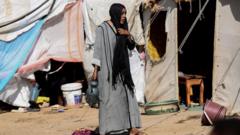This important dismissal reflects the complexities of international law as the Sudanese government faces continued strife in its civil war.
**U.N. Court Dismisses Sudan's Genocide Accusations Against U.A.E.**

**U.N. Court Dismisses Sudan's Genocide Accusations Against U.A.E.**
The International Court of Justice ruled it has no jurisdiction over Sudan's claims of genocide.
The International Court of Justice (ICJ) has decided to dismiss the case brought by Sudan against the United Arab Emirates (U.A.E.), accusing it of exacerbating the genocide in Sudan's civil war by backing paramilitary forces. The court, holding a vote of 14-2, stated it “manifestly lacks jurisdiction” to rule on the allegations presented by the Sudanese government.
The ICJ did not evaluate the veracity of Sudan's claims but declined to grant the requested provisional measures against the U.A.E., stating that the Emirates had opted out of a vital clause relating to inter-state disputes under the 1948 Genocide Convention when signing the treaty in 2005. This critical clause typically allows nations to bring each other to court over alleged breaches.
In March, the Sudanese government had urged the court to address its concerns, particularly accusing the U.A.E. of funding and arming the Rapid Support Forces (R.S.F.), a powerful group opposing the Sudanese military. During the court proceedings, Sudan sought immediate orders to demand the Emirates halt any actions that could be construed as genocide against the Masalit ethnic group residing in Darfur.
However, the U.A.E. categorically refuted the accusations, asserting that Sudan provided insufficient evidence for its claims and reinforcing the argument that the court lacked the power to adjudicate the matter.
The ICJ did not evaluate the veracity of Sudan's claims but declined to grant the requested provisional measures against the U.A.E., stating that the Emirates had opted out of a vital clause relating to inter-state disputes under the 1948 Genocide Convention when signing the treaty in 2005. This critical clause typically allows nations to bring each other to court over alleged breaches.
In March, the Sudanese government had urged the court to address its concerns, particularly accusing the U.A.E. of funding and arming the Rapid Support Forces (R.S.F.), a powerful group opposing the Sudanese military. During the court proceedings, Sudan sought immediate orders to demand the Emirates halt any actions that could be construed as genocide against the Masalit ethnic group residing in Darfur.
However, the U.A.E. categorically refuted the accusations, asserting that Sudan provided insufficient evidence for its claims and reinforcing the argument that the court lacked the power to adjudicate the matter.





















